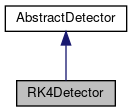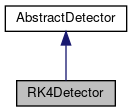Use the fourth order Runge-Kutta method to calculate the output. More...
#include <detectors.h>


Public Member Functions | |
| RK4Detector (const parameter_t f, const parameter_t mu, const parameter_t d, const parameter_t sr, const parameter_t detBw, const parameter_t gain) | |
| virtual void | reset () |
| Reset internal values to 0 This is invoked when Detect.seek() is called. | |
| virtual void | process (discriminator_t *target, const inputSample_t *start, const std::size_t count) override |
| Method to process audio using fourth order Runge-Kutta approximation. More... | |
 Public Member Functions inherited from AbstractDetector Public Member Functions inherited from AbstractDetector | |
| AbstractDetector (parameter_t f, parameter_t mu, parameter_t d, parameter_t sr, parameter_t detBw, parameter_t gain) | |
| void | processAudio (discriminator_t *target, const inputSample_t *start, std::size_t count) |
| Process audio using the numerical method appropriate to the derived class. More... | |
| bool | searchNormalize (parameter_t searchStart, parameter_t searchEnd, const parameter_t toneDuration, const parameter_t forcing_amplitude) |
| Normalise the detector frequency using an iterative scheme. More... | |
| bool | amplitudeNormalize (const parameter_t forcing_amplitude) |
| Set the detector's a and iScale attributes by profiling an ideal detector response. More... | |
| void | scaleAmplitude () |
| Calculate amplitude scale factor. | |
| void | generateTone (inputSample_t *tone, const std::size_t duration, const parameter_t frequency) |
| Generate a sine tone. More... | |
| parameter_t | getW (void) const |
| Find the speficied characteristic frequency for this detector (post-modulation and -normalisation) More... | |
Private Attributes | |
| std::complex< parameter_t > | zp |
| previous z value | |
| std::complex< parameter_t > | zpp |
| z value two samples ago | |
| inputSample_t | xp |
| previous audio input sample | |
| inputSample_t | xpp |
| audio input sample two samples ago | |
Additional Inherited Members | |
 Protected Member Functions inherited from AbstractDetector Protected Member Functions inherited from AbstractDetector | |
| template<class Archive > | |
| void | save (Archive &archive) const |
| Save the DetectorBank as a cereal archive. More... | |
| template<class Archive > | |
| void | load (Archive &archive) |
| Load the DetectorBank from a cereal archive. More... | |
| void | makeScaleVectors () |
| Make freq and factor vectors for given method and normalisation. | |
| void | getScaleValue (const parameter_t fr) |
| Get a scale value for a given frequency. | |
 Static Protected Member Functions inherited from AbstractDetector Static Protected Member Functions inherited from AbstractDetector | |
| static const parameter_t | getLyapunov (const parameter_t bw, const parameter_t amp) |
| Find the first Lyapunov coefficient required for a given bandwidth, with a given forcing amplitude. More... | |
 Protected Attributes inherited from AbstractDetector Protected Attributes inherited from AbstractDetector | |
| parameter_t | w |
| Characteristic frequency. | |
| parameter_t const | mu |
| Distance from the bifurcation point. | |
| parameter_t const | d |
| Detector damping factor. | |
| parameter_t const | sr |
| Sample rate. | |
| parameter_t const | detBw |
| Detector bandwidth. | |
| parameter_t const | gain |
| Detector gain. | |
| discriminator_t | aScale |
| Amplitude scaling factor. | |
| parameter_t | iScale |
| Scaling factor for imaginary part. | |
| parameter_t | b |
| Detector's first Lyapunov coefficent. | |
| discriminator_t | scale |
| Detector's scale factor. | |
| bool | nrml { false } |
| If search normalisation has been applied. | |
| std::vector< parameter_t > | detScaleFreqs |
| std::vector< discriminator_t > | detScaleFactors |
 Static Protected Attributes inherited from AbstractDetector Static Protected Attributes inherited from AbstractDetector | |
| static constexpr int | maxNormIterations { 100 } |
| The maximum number of iterations to find best response during search_normalization. | |
| static constexpr double | normConverged { 1.0028922878693671 } |
| Ratio of discovered frequency to specification frequency to be considered "close enough" during seach_normalization. More... | |
| static const std::array< std::vector< parameter_t >, 8 > | scaleFreqs |
| static const std::array< std::vector< discriminator_t >, 8 > | scaleFactors |
Detailed Description
Use the fourth order Runge-Kutta method to calculate the output.
Uses the discrete Runge-Kutta method to solve the first order differential equation \(y'=f(y, t)\). Let:
\begin{eqnarray*} k_0 & = & f(y_n, n-2) \\ k_1 & = & f(y_n + k_0\delta, n-1) \\ k_2 & = & f(y_n + k_1\delta, n) \\ k_3 & = & f(y_n + k_22\delta, n) \end{eqnarray*}
where \(\delta\) is the time step between samples,
then:
\[ y_{n+1} = y_n + \frac\delta 3(k_0 + 2k_1 + 2k_2 + k_3). \]
This procedure is used iterativey to find output samples of the Hopf bifurcation
\[\dot z=(\mu+j\omega_0)z + b|z|^2z + X\]
with control parameter \(\mu\), first Lyapunov coeffcient \(b\) (real) and driving force \(X\). For a supercritical bifurcation, \(b < 0\). \(b = 0\) yeilds a degenerate ("Bautin") bifurcation, and \(b > 0\) yeilds a subcritical bifurcation which is unstable.
Definition at line 291 of file detectors.h.
Constructor & Destructor Documentation
◆ RK4Detector()
| RK4Detector::RK4Detector | ( | const parameter_t | f, |
| const parameter_t | mu, | ||
| const parameter_t | d, | ||
| const parameter_t | sr, | ||
| const parameter_t | detBw, | ||
| const parameter_t | gain | ||
| ) |
- Parameters
-
f Detector centre frequency (Hz) mu Detector control parameter. (Setting mu = 0 positions the system at the bifurcation point) d Detector damping ratio sr Sample rate of input audio detBw Detector bandwidth gain Detector gain
Member Function Documentation
◆ process()
|
overridevirtual |
Method to process audio using fourth order Runge-Kutta approximation.
Called by runChannels() in DetectorBank.
- Parameters
-
target Output array. This should have the correct dimensions for your desired detector bank: height = number of detectors, length = length of audio input. start Current audio sample count Number of frames to process
Implements AbstractDetector.
The documentation for this class was generated from the following file:
- /home/keziah/onsets/DetectorBank/src/detectors.h
 1.8.13
1.8.13